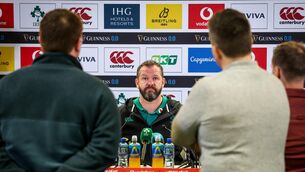Ireland's back three options offer tasty range of offensive delights

DELIGHT: Ireland’s Michael Lowry runs in to score his sides third try.
NOT the type of century you want to achieve - especially with question marks hanging over Italy's very existence in the Six Nations championship with South Africa making no secret of where they see their long term future. Yesterday’s defeat in Dublin marked the 100th defeat suffered by Italy since their arrival in this tournament back in 2000.
The problem with this fixture, or indeed any involving Italy across the Six Nations, is one knows in advance, with virtual certainty, who is going to win. The only issue up for debate is the margin of victory and that, in many instances, comes down to the approach in the selection of the national coach.










